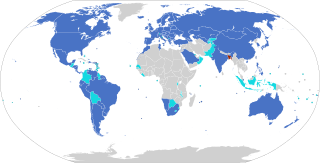 W
WThe Hague Convention Abolishing the Requirement of Legalisation for Foreign Public Documents, the Apostille Convention, or the Apostille Treaty, is an international treaty drafted by the Hague Conference on Private International Law. It specifies the modalities through which a document issued in one of the signatory countries can be certified for legal purposes in all the other signatory states. A certification under the terms of the convention is called an apostille or Hague apostille. It is an international certification comparable to a notarisation in domestic law, and normally supplements a local notarisation of the document. If the convention applies between two countries, such an apostille is sufficient to certify a document's validity, and removes the need for double-certification, by the originating country and then by the receiving country.
 W
WThe Environmental Modification Convention (ENMOD), formally the Convention on the Prohibition of Military or Any Other Hostile Use of Environmental Modification Techniques is an international treaty prohibiting the military or other hostile use of environmental modification techniques having widespread, long-lasting or severe effects. It opened for signature on 18 May 1977 in Geneva and entered into force on 5 October 1978.
 W
WThe Forced Labour Convention, the full title of which is the Convention Concerning Forced or Compulsory Labour, 1930 (No.29), is one of eight ILO fundamental conventions of the International Labour Organization. Its object and purpose is to suppress the use of forced labour in all its forms irrespective of the nature of the work or the sector of activity in which it may be performed. The Convention defines forced labour as "all work or service which is exacted from any person under the menace of any penalty and for which the said person has not offered himself voluntarily", with few exceptions like compulsory military service. The convention excludes "adult able-bodied males", to whom legal imposition of forced labour is allowed.
 W
WThe International Opium Convention, signed at The Hague on January 23, 1912 during the First International Opium Conference, was the first international drug control treaty. It was registered in League of Nations Treaty Series on January 23, 1922. The United States convened a 13-nation conference of the International Opium Commission in 1909 in Shanghai, China, in response to increasing criticism of the opium trade. The treaty was signed by Germany, the United States, China, France, the United Kingdom, Italy, Japan, the Netherlands, Persia, Portugal, Russia, and Siam. The Convention provided, "The contracting Powers shall use their best endeavours to control, or to cause to be controlled, all persons manufacturing, importing, selling, distributing, and exporting morphine, cocaine, and their respective salts, as well as the buildings in which these persons carry such an industry or trade."
 W
WThe Outer Space Treaty, formally the Treaty on Principles Governing the Activities of States in the Exploration and Use of Outer Space, including the Moon and Other Celestial Bodies, is a treaty that forms the basis of international space law. The treaty was opened for signature in the United States, the United Kingdom, and the Soviet Union on 27 January 1967, and entered into force on 10 October 1967. As of June 2020, 110 countries are parties to the treaty, while another 23 have signed the treaty but have not completed ratification. In addition, Taiwan, which is currently recognized by 14 UN member states, ratified the treaty prior to the United Nations General Assembly's vote to transfer China's seat to the People's Republic of China (PRC) in 1971.
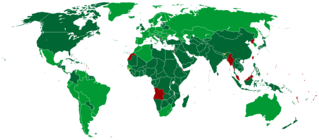 W
WThe International Convention on the Elimination of All Forms of Racial Discrimination (ICERD) is a United Nations convention. A third-generation human rights instrument, the Convention commits its members to the elimination of racial discrimination and the promotion of understanding among all races. The Convention also requires its parties to outlaw hate speech and criminalize membership in racist organizations.
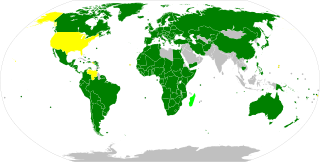 W
WThe Convention Relating to the Status of Refugees, also known as the 1951 Refugee Convention or the Geneva Convention of 28 July 1951, is a United Nations multilateral treaty that defines who a refugee is, and sets out the rights of individuals who are granted asylum and the responsibilities of nations that grant asylum. The Convention also sets out which people do not qualify as refugees, such as war criminals. The Convention also provides for some visa-free travel for holders of refugee travel documents issued under the convention.
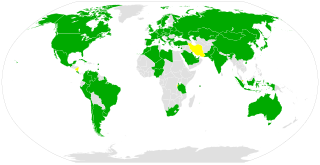 W
WThe Convention on Registration of Objects Launched into Outer Space was adopted by the United Nations General Assembly in 1974 and went into force in 1976. As of December 2018, it has been ratified by 69 states.
 W
WThe Convention on International Liability for Damage Caused by Space Objects, also known as the Space Liability Convention, is a treaty from 1972 that expands on the liability rules created in the Outer Space Treaty of 1967. In 1978, the crash of the nuclear-powered Soviet satellite Kosmos 954 in Canadian territory led to the only claim filed under the Convention.
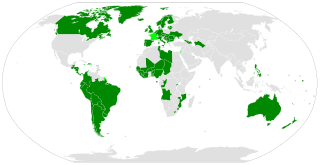 W
WThe Convention on the Reduction of Statelessness is a 1961 United Nations multilateral treaty whereby sovereign states agree to reduce the incidence of statelessness. The Convention was originally intended as a Protocol to the Convention Relating to the Status of Refugees, while the 1954 Convention Relating to the Status of Stateless Persons was adopted to cover stateless persons who are not refugees and therefore not within the scope of the Convention Relating to the Status of Refugees.
 W
WThe Vienna Convention on Consular Relations is an international treaty that defines a framework for consular relations between sovereign states. It codifies many consular practices that originated from state custom and various bilateral agreements between states.